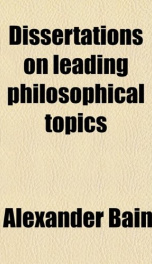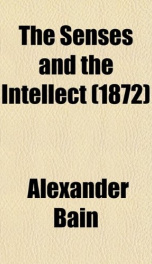dissertations on leading philosophical topics

Purchase of this book includes free trial access to www.million-books.com where you can read more than a million books for free. This is an OCR edition with typos. Excerpt from book: MILL'S THEORY OF THE SYLLOGISM. (Mind, iii., 137.) Mill includes under Syllogism two things that ought to be kept separate. What he gives is not properly Syllogism. The first of the two objects of the Syllogism, almost exclusively set forth by Mill, is to exhibit the Deductive process in its simplest type. For a scientific deduction, first obtain a general rule or law ; next prove an identity between a given instance and the subject of the rule or law ; whence, apply the predicate of the law to the subject of the new instance. All this belongs to the matter, and scarcely at all to the form. Confining his view to this simple type, Mill makes out Syllogism a petitio principii; and indicates the solution by calling to mind the proper meaning of a general proposition. The second meaning of Syllogism is the formal relation between premiss and conclusion whatever the matter be. If all cases of argument were of the type of Barbara, Syllogism would never have been invented. But in many kinds of reasoning, not unfrequent, the formal relation is puzzling and uncertain, or even misleading. Hence the machinery of Figures and Moods, which is the most strict and proper expression of the Syllogism. On this view, the theory of the Syllogism is not the whole theory of the proof of a conclusion from the premisses ; it is the theory of one part of the proofin some instances so evident as not to make a question at all, in other instances so embroiled with verbal perplexities as to demand the help of a rule or a formula furnished by the detailed figures and moods. Thus, the formalist might so guard himself as to answer the charge olpetitio principii by the equally grave charge of i9noratio elenchi. Mill's solution of the material inference the sound view of general names and propositions. In la...
Info about the book
Author:
Series:
Unknown
ASIN:
B008M0EXYO
Rating:
3/5 (2)Your rating:
0/5
Languge:
English
Users who have this book
Users who want this book
What readers are saying
What do you think? Write your own comment on this book!
write a commentif you like dissertations on leading philosophical topics try:
Do you want to exchange books? It’s EASY!
Get registered and find other users who want to give their favourite books to good hands!





